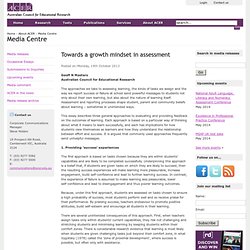

Leading thinkers in conversation. Three leading thinkers in education - Professor Geoff Masters AO, Dr Michele Bruniges AM and Sir Michael Barber - gathered in Sydney last month to discuss assessment reform and innovation.
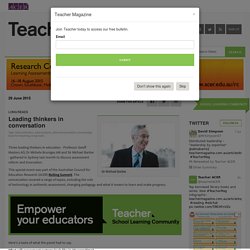
This special event was part of the Australian Council for Education Research (ACER) Rolling Summit. The conversation covered a range of topics, including the role of technology in authentic assessment, changing pedagogy and what it means to learn and make progress. Here's a taste of what the panel had to say. What will assessment systems look like in 10 years time? Sir Michael Barber, a former adviser to the Blair Government in the UK, predicts a future in which new technology, virtual learning environments and digital platforms will allow educators to combine authentic assessment and testing. What Happens When Students Boycott a Standardized Test? — The Atlantic. The movement to opt out of nationwide exams is gaining traction—and forcing policymakers to rethink the role of such assessments in public education.
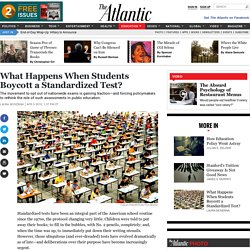
Standardized tests have been an integral part of the American school routine since the 1970s, the protocol changing very little. Children were told to put away their books; to fill in the bubbles, with No. 2 pencils, completely; and, when the time was up, to immediately put down their writing utensils. However, those ubiquitous (and ever-dreaded) tests have evolved dramatically as of late—and deliberations over their purpose have become increasingly urgent. This semester, students in roughly three dozen states and the District of Columbia are taking one of two new standardized tests that are known by their consonant-riddled acronyms: PARCC, which is part of the Pearson family, and SBAC, which was developed by a consortium of states. Here in New Jersey, I witnessed the anti-testing politics evolve over the past few months. In the U.S. Learning assessments – designing the future. [Image © Shutterstock/29september] Processes for assessing student learning are undergoing fundamental transformation.
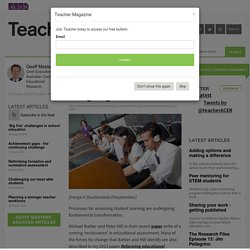
Geoff Masters. A commonly proposed strategy for raising achievement levels in schools is to specify high expectations or ‘standards’ of student performance and to hold students, teachers and schools accountable for achieving those standards.
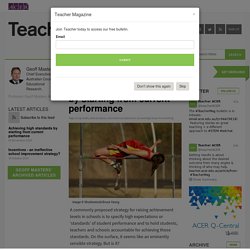
On the surface, it seems like an eminently sensible strategy. But is it? ACER encounters this question regularly in our work in developing countries. Many of these countries benchmark their school curricula against curricula in the developed world, sometimes adopting or adapting the curricula of high-performing countries directly. By specifying world-class learning expectations, they hope to lift the performances of their students to world-class standards. We are then asked to assist in assessing how well students are performing against curricular expectations. We are not the first to observe this. A common conclusion is that students, teachers, schools, and perhaps the entire education system, are ‘failing’. Why Standardized Tests Don't Measure Educational Quality - ASCD Educational Leadership Magazine. March 1999 | Volume 56 | Number 6Using Standards and Assessments Pages 8-15 W.
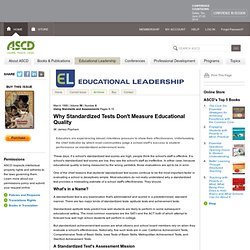
James Popham Educators are experiencing almost relentless pressure to show their effectiveness. Unfortunately, the chief indicator by which most communities judge a school staff's success is student performance on standardized achievement tests. These days, if a school's standardized test scores are high, people think the school's staff is effective. One of the chief reasons that students' standardized test scores continue to be the most important factor in evaluating a school is deceptively simple. What's in a Name? A standardized test is any examination that's administered and scored in a predetermined, standard manner. Www.aph.gov.au/~/media/Committees/Senate/committee/eet_ctte/naplan_2013/report/report.pdf?_cldee=Y2hyaXNzbmVsbEBjYXVsZmllbGRncy52aWMuZWR1LmF1. Research.acer.edu.au/cgi/viewcontent.cgi?article=1021&context=aer. School tests. Monitoring Monitoring student learning.
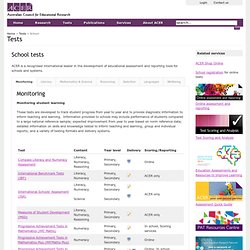
Research. ACER conducts research into the assessment and reporting of a wide range of educational outcomes (academic and social).
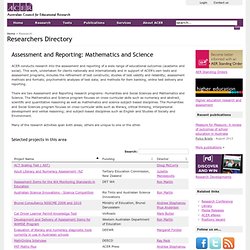
Timed Tests and the Development of Math Anxiety. Diagnostic Questions. How To Use Formative Assessment With (And Without) Technology. Sometimes, integrating technology into your daily workflow and lesson plans isn’t that hard.
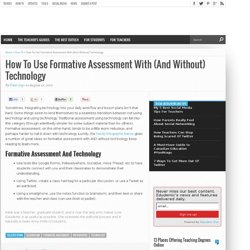
Some things seem to lend themselves to a seamless transition between not using technology and using technology. Traditional assessment using technology can fall into this category (though admittedly simpler for some subject material than for others). Formative assessment, on the other hand, tends to be a little more nebulous, and perhaps harder to nail it down with technology. Luckily, the handy infographic below gives a number of great ideas on formative assessment with AND without technology.
Keep reading to learn more. Use tools like Google Forms, Polleverywhere, Socrative, Voice Thread, etc to have students connect with you and their classmates to demonstrate their understanding. Katie was a teacher, graduate student, and is now the lady who makes sure Edudemic is as useful as possible. Media Centre. Posted on:Monday, 14th October 2013 Geoff N MastersAustralian Council for Educational Research The approaches we take to assessing learning, the kinds of tasks we assign and the way we report success or failure at school send powerful messages to students not only about their own learning, but also about the nature of learning itself.
